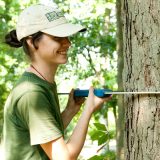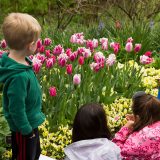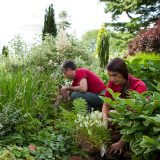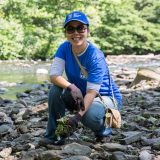Citizen Science
Citizen science is the use of enthusiastic volunteers to collect data and generate results. At NYBG, citizen science volunteers are part of several ongoing research, data collection, and Herbarium transcription and digitization projects critical to The New York Botanical Garden’s mission.
To study the effects of weather and climate change on Forest plants, the Garden engages citizen scientists in collecting important scientific data on specific species of trees, shrubs, and other plants. Forest citizen scientists learn about native plant species and how to collect and input data on the seasonal change of those species in the Forest such as when leaves, flowers, and fruits appear (a science known as phenology).
Working with partners at the National Phenology Network, the Northeast Regional Phenology Network, The New York Phenology Project, Environmental Monitoring and Management Alliance, and Clean Air-Cool Planet, the Garden has tailored its program to match the needs of scientists who use the collected data to study various aspects of climate change.
Herbarium citizen scientists capture information about the historical who, what, when, and where of collection specimens. This information aids scientists in studying sensitive changes in species distributions after man-made environmental events such as climate change, air pollution, and habitat destruction.






